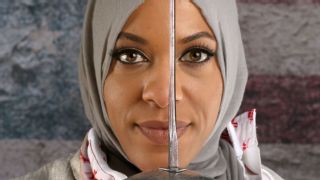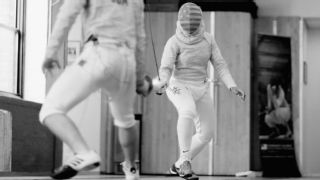She could keep her public remarks simple and bland. Lord knows enough athletes do that. Anyway, her bio is exemplary: She went to Duke on an academic scholarship and graduated in 2009 with a double major in international relations and African-American studies, and a minor in Arabic. She was also a three-time All-American in fencing. She's a suburban Jersey kid by birth whose father is a retired narcotics detective, and her mother is a soon-to-be retired special ed teacher. And she shares their zeal for public service.
Since committing full time to chase an Olympic berth in 2009, she's ridden the PATH train to nearby New York City to train on weekdays and to mentor the 200 or so kids who show up every Saturday morning at a fencing foundation run by six-time U.S. Olympian Peter Westbrook. When she speaks to those kids or to other groups, which is often, she frequently closes her talks by urging people to be proactive in their communities, and she encourages women and girls to overcome their timidity, dream big, think outside the box -- same as she once did.
She has a poise that's striking, a smile that's hard to forget, and a tenderness that is palpable. She makes no claims to phony toughness, admitting, "I struggled as a kid," with feeling different. She now runs her own clothing business, Louella, which is named after her grandmother, on top of everything else and counts herself as an eloquent example of the way sports can change someone's life. Her mother, Denise, sometimes worries about her -- "I don't want her to lose sight of having fun," she told ESPN in 2011. "I tell her, 'You don't have to carry our entire community on your shoulders.'"
A devout Muslim, Ibtihaj Muhammad says, "I feel I can handle it." (Pronounced: Ib-tee-haj.)
Yet none of that spared 30-year-old Muhammad from having a total stranger ask her if she was a "terrorist" who intended to "blow something up" as she walked through Times Square in mid-April, minding her own business. Muhammad photographed the man and posted his image on Twitter.
Nor was Muhammad spared from having an official in Austin at the South by Southwest conference in March from ordering her to remove her hijab -- the religious head covering that she wears -- before he'd take her photo for her panelist credential. When Muhammad explained why she couldn't remove it, the man scoffed and said, "Well, you're in Texas now."
She says, "At first I thought he was kidding."
Muhammad, who will become the first American athlete to compete at the Olympics in a hijab at the Rio Olympics in August, is philosophical about such incidents as she calmly recounts them. Her gaze is direct. Her temperament even. Yes, she could've chosen to deflect questions about her Muslim faith and being one of the few African-Americans in her sport. But it's a fallacy to think that would've made her life any easier.
So, as she's jokingly said, "I'm just your basic Hijabi Zorro."
There will be other athletes in Rio who are better known than Muhammad, though she is a legitimate medal hopeful in the team and individual sabre events. But it is hard to think of anyone whose symbolism is more important. She has taken her messages of tolerance and what life as a Muslim-American woman is like everywhere she goes, be it "The Ellen DeGeneres Show" (where she did a hilarious fencing demonstration with DeGeneres' sidekick Andy Zeron), to interviews she did after she was named to Time Magazine's list of the 100 Most Influential People in the World for 2016. In February, she was invited to a private meeting that President Barack Obama held with other prominent Muslim-Americans before he gave a speech at the Islamic Society of Baltimore, his first visit in office to an American mosque.
"Where's my Olympian? Stand up," Obama said before his talk, scanning the audience of hundreds that Muhammad was sitting among, wanting her to rise and hear the applause.
Muhammad prefers to emphasize positive examples like that when describing what her path to the Olympics has become. But she does not shrink from asserting Muslims and minorities should enjoy the same rights and protections in America as anyone else because, "I feel like I owe it to my community, I owe it to people who look like me and fight struggles every day, to hear something different. It's up to all us to combat these things. I have to speak up because I know there were people before me that did it."
She constantly says, "I'm blessed to be in this position."
And this: "I wasn't going to allow other people's misconceptions to change my journey."
So, when reporters inquire about what kind of online harassment she receives on her Twitter or Instagram accounts, Muhammad smiles and says, "Oh, sure, there are internet trolls everywhere. But that's what the delete button is for. And I use it." If asked for examples of prejudice she's experienced, she often diverts the discussion instead to the "hundreds of positive messages that cancel them out," or how after taking up fencing for the first time as a 13-year-old girl, she felt wearing the masked headgear and full-length uniform that covered her body had much the same effect as wearing the hijab: She feels it "liberates" her.

"Something I definitely struggled with as a kid was traveling to different schools and different communities and hearing that I made people uncomfortable because of my skin color, because of my religion," she says. "Being covered allows people to see me for my skills and my ideas."
Muhammad knows history. She knows the regard that Muslims are experiencing now in America has had ugly precedents and parallels in our past. The Japanese kamikaze pilots of World War II were regarded with the same horror around the world that jihadist suicide bombers are now. America's response then -- ripping Japanese-Americans out of their homes and throwing them into internment camps -- remains an ugly blot on our history. Similarly, African-Americans have spoken out about being punished for the "crime of being black" since the founding of this country.
What America promises all of its people and what it delivers is often at odds with Dr. Martin Luther King's famous wish that everyone be judged for the content of his or her character. Muhammad feels to be silent, especially at this point in American history, would be indefensible. After the 9/11 attacks on New York's World Trade Center happened 30 minutes away from her family's home in New Jersey, her mother said there was "panic" in their home that night. In the weeks to come, her five children were harassed and she was sometimes screamed at as she drove down the street wearing her hijab. Fifteen years later, it could still happen.
Muhammad has traveled to 30 countries as part of her work and admits she's had to trim in even how late she goes out at night for dinner. She has feared being prevented from boarding flights on the way to her Olympic qualifying meets because of her hijab or fencing equipment she carries.
"We're living in a time where people feel comfortable spewing their hate and harassing the innocent on our streets. We need change," Muhammad tweeted after her incident with the heckler in Times Square.
After Republican presidential candidate Donald Trump demanded that all Muslims be barred from entering the country in response to terror attacks in San Bernardino, California, and around the world, and suggested a national registry for Muslims, Muhammad spoke out forcefully again.

"Unfortunately, we have people who are in the presidential race who are providing a platform for hate speech and fearmongering," Muhammad told London's Daily Mail, "and they're creating a space where it's acceptable to speak out against immigrants, to speak out against Muslims and to really publicize this inherent racism that I feel a lot of people have. It creates a really scary environment, and I fear for the safety of minorities in our country. It's becoming more and more acceptable for people to voice their fascist beliefs and it's upsetting.
"I'm hopeful that things will change and soon, because I fear that history is repeating itself. The Civil Rights Movement wasn't that long ago. Segregation wasn't that long ago. Japanese internment wasn't that long ago. And when you think things like you want to ban Muslims from entering the country or you want to build a wall to separate the U.S. from Mexico [as Trump has also said], I think these are things that are reminiscent of really dark times within, not just our country, but worldwide."
Sometimes fear and prejudice talk louder than fairness.
"When I hear people here say they want to throw all Muslims back to 'their' country," Muhammad says, "I think, 'Well, where am I going to go?' I'm American, you know? I've never questioned myself as an American or my position here. This is my home. This is who I am. My family has always been here. We're American by birth. This is all that I know. I feel American to my bones."
Muhammad happened to be standing in the middle of Times Square again as she said that. This time there wasn't a bigot taunting her. She was appearing in late April along with dozens of other American athletes at the U.S. Olympic Committee's "100 Days from Rio" event that was open to the public. She had just spent part of her morning teaching first lady Michelle Obama and 15 to 20 children a few tips about fencing, at times jousting with comically long foam swords that made them laugh.
When asked a couple hours later how she was holding up after speaking to wave and after wave of visitors and reporters, Muhammad sighed and said, "Oh, do I look tired?"
No, someone responded, you seem buoyant.
Laughing now, she said, "I try."
